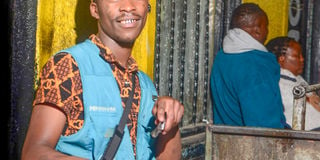Ex-criminal Katelo's journey from a life of crime to owning a thriving street food business in Naivasha

Bernard Wambua poses for a photo on August 6, 2025.
Every day, by around 3pm, Bernard Wambua, popularly known as Katelo, sets up his meat and potato roasting stand outside the Park View Hotel in Naivasha. Just a few minutes after he starts roasting a variety of foods on the jiko, customers start to arrive.
As the aroma fills the air, more and more people gather around. Each order is tailored to the customer's preference: some like their food extra crispy, while others prefer it soft and tender.
Some linger longer at the stand, clearly indicating that one serving is not enough, while others call their friends to join them.
Wambua turned his life around after quitting crime and choosing the path of entrepreneurship.
He turned to a life of crime after his girlfriend broke his heart, shattering his world.
"I lost a sense of purpose. I felt lost and numb. I drifted into the streets, where the wrong crowd welcomed me with open arms. What began as petty theft to numb the pain soon spiralled into a life of crime. I was searching for something to fill the void left by love," he says.
He used to look forward to the weekends, when he would mug people. During that period, he was arrested several times. However, everything changed after he spent a month in prison, an experience which became a turning point in his life.
"I was deeply entangled in crime. Although my mother kept urging me to stop, I just wouldn’t listen. After I was arrested during the Gen Z protest last year and jailed for a month, that was my turning point," he recalls.
During his time behind bars, Wambua had the opportunity to speak with several inmates, one of whom made an impact on him. He began to seriously reflect on the consequences of his actions.
"One of the inmates had served for three years, undergone a transformation, and become a pastor. He sat me down and told me to consider how I wanted to live my life beyond the present moment. I decided to change my life," he says.
His decision was further cemented after a conversation with his mother, who gave him an ultimatum: She told him that if he was ever arrested again, she would neither visit him nor offer any help.
After his release, his mother continued to support him through the transition. Although he actively looked for a job, his criminal record made it difficult for him to find employment.
As a result, Wambua made the bold decision to become self-employed. With help from his mother, who provided him with startup capital he started a street food business.
“My mother's support has been very significant throughout this process. Without her, I could easily have fallen back into crime. I truly attribute my success to her," he says.
Today, Wambua runs a small but growing food business near Park View in Naivasha town, selling potatoes and fried meat for Sh10 and Sh30 per portion, respectively.
On average, he makes a daily profit of Sh1,500 and hopes to expand by opening a restaurant where customers can sit and enjoy the food. He believes that this growth will improve not only his own life, but also create job opportunities for other young people trying to turn their lives around.
"Many of my customers support my business because they see the change in me. Some even tell me they buy from me just to encourage me to stay away from crime," he says.
Looking ahead, Wambua hopes to return to school to hone his culinary expertise and earn a formal qualification, as he currently has no professional training.
He is also passionate about inspiring his peers to turn their backs on crime and embrace entrepreneurship, even if they lack formal qualifications.
“Young people need to understand that doing honest work may not be easy at first, but it brings peace. Starting with something small, like selling coffee, is better than stealing, and growth is possible with consistency,” he advises.
